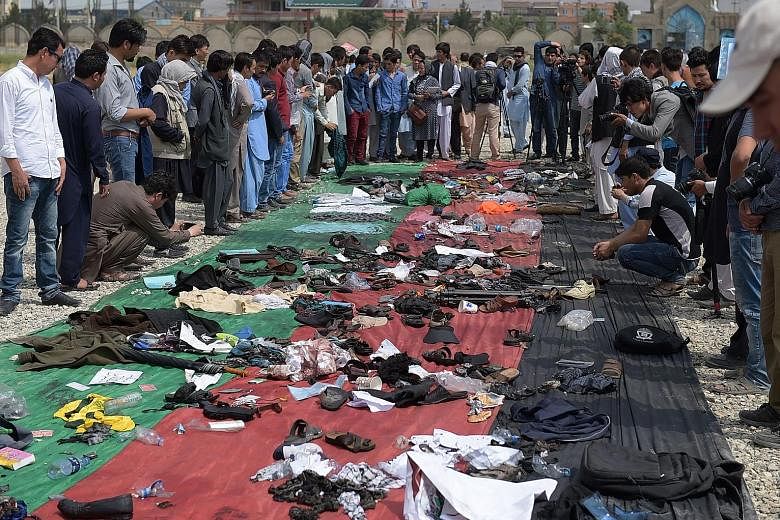KABUL • Relatives of some of those killed in a suicide attack in Kabul searched through a bloodied assortment of belongings left after the twin blasts as they prepared for funerals in a mood of growing anger with political leaders.
"Those are my cousin's sandals," said Mr Sayed Mohammad yesterday as he stood in a crowd of people looking for anything familiar among the remnants spread out by the authorities on an Afghan flag in the Dasht-e-Barchi area of Kabul where the funerals will take place.
Mr Sayed's cousin was one of four relatives he lost last Saturday when suicide bombers set off twin blasts at a protest by members of the mainly Shi'ite Hazara community, who were protesting against the planned route of a power line. "His dead body is in a hospital. He was the only breadwinner of his family. I'm looking here if I can find anything more from other relatives."
President Ashraf Ghani, declaring yesterday a national day of mourning, said: "I promise you that I will avenge the blood of our loved ones on the perpetrators of this crime."
At least 80 people were killed and more than 230 wounded in Kabul's deadliest attack in 15 years. The attack, claimed by the Islamic State in Iraq and Syria (ISIS) and described by the top United Nations official in Afghanistan as a "war crime", drew condemnation and offers of support from countries including Russia and the United States.
But for some, there was a sense of fury at both the government and Hazara political leaders who they said have exploited the grievances of their community to shore up their own power bases.
"They sold us and we will never forget this," said Mr Ghulam Abbas, a Hazara mourner. "They've built skyscrapers for themselves and their families from our blood."
The Hazara, a Persian-speaking minority who make up about 9 per cent of the population have, by and large, supported Mr Ghani's government, which includes some of their senior leaders, but many complain bitterly that their support has not been returned.
Last Saturday's protest over the route of a multi-million dollar power line, which demonstrators wanted to reroute through two provinces with large Hazara populations, had become a touchstone for a wider sense of injustice.
The demonstration took place under tight security, with much of Kabul blocked off. But there was disagreement in the Hazara community as well as in the government about whether it should have gone ahead given the risk of an attack.
For many, such as 42-year-old Mr Dost Mohammad, who was nearby when the two explosions went off, there was a sense of abandonment by the authorities. "With all this misery, the government doesn't care about its own citizens."
Meanwhile, another suicide bombing claimed by ISIS killed at least 15 people in a Shi'ite area of northern Baghdad yesterday, security and medical officials said.
The bombing, which struck near a major Shi'ite shrine, also wounded at least 29 people, the officials said. ISIS issued a statement claiming the attack, saying it targeted soldiers and pro-government paramilitaries in the area.
REUTERS, AGENCE FRANCE-PRESSE

